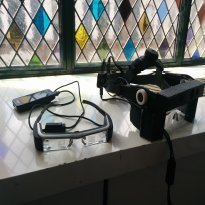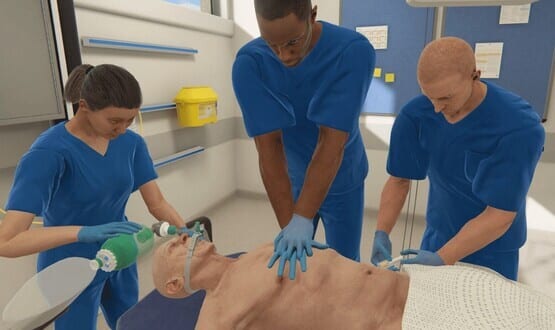Smart glasses offer vision of future
- 7 August 2014

A pair of smart glasses that can help improve the vision of people with sight loss has won a £500,000 award to go towards a large-scale test.
The glasses, developed by Oxford University and the Royal National Institute of Blind People, won the People’s Choice award in the Google Impact Challenge, for UK charities using technology to tackle significant problems.
Stephen Hicks, the Oxford University researcher who has led the project, said work on the glasses started in 2011 with funding from the NHS National Institute for Health Research.
The glasses are fitted with a 3D depth camera that picks up the structure of nearby objects, separating the foreground from the background and allowing wearers to focus on objects and people nearest to them.
The images are then processed by a computer and projected onto the lenses, which are transparent so wearers can see what they normally would with the projections overlaid.
The original prototype glasses weigh about 300 grams and need to be connected to a laptop, but the most recently developed model has been “shrunk down” to a smaller size which can run from a handset device.
Hicks said the researchers can tailor the glasses to each person depending on their level of sight loss, using measures such as field of vision and perception of colour to develop their “palette” for the display.
“It comes down to the visual abilities of the user – it’s about making it as quick to use and intuitive as possible.”
Hicks said the glasses can help assist people with night blindness, such as those with glaucoma, by allowing them to see structures in low light, while also allowing others to see people they are speaking to in greater detail.
“People have said that it’s the first time they’ve seen proper ears, or someone’s face.”
Hicks said the funding will allow the product team to produce 100 pairs of the smart glasses and test them with up to 1,000 people starting from next year.
The researchers are focussing on ensuring that the software for the glasses can run efficiently on a mobile handset, while also ensuring that the glasses are as lightweight and functional as possible.
Hicks said the funding from the NIHR came with the condition that a commercialisation agreement be developed with the NHS, and the glasses have been trialled as part of the Oxford Academic Health Science Network.
Neil Heslop, the group director of RNIB Solutions, said the money from Google will allow the smart glasses project to move to the next stage of development, with hopes to roll them out more widely by 2016.
Heslop said the RNIB is increasing its involvement in the development of technology, and has formed partnerships with major tech companies like Google, Apple and Microsoft to develop products for those with sight loss and bring them to a wider market.
“In order for people to achieve the independence that they have the right to expect and the quality of life that education and employment offers, mobile services and mobile devices…are at the strategic epicentre.
“All of the advances we’ve seen in the last five years are nothing compared to what we will see in the next five years.”



